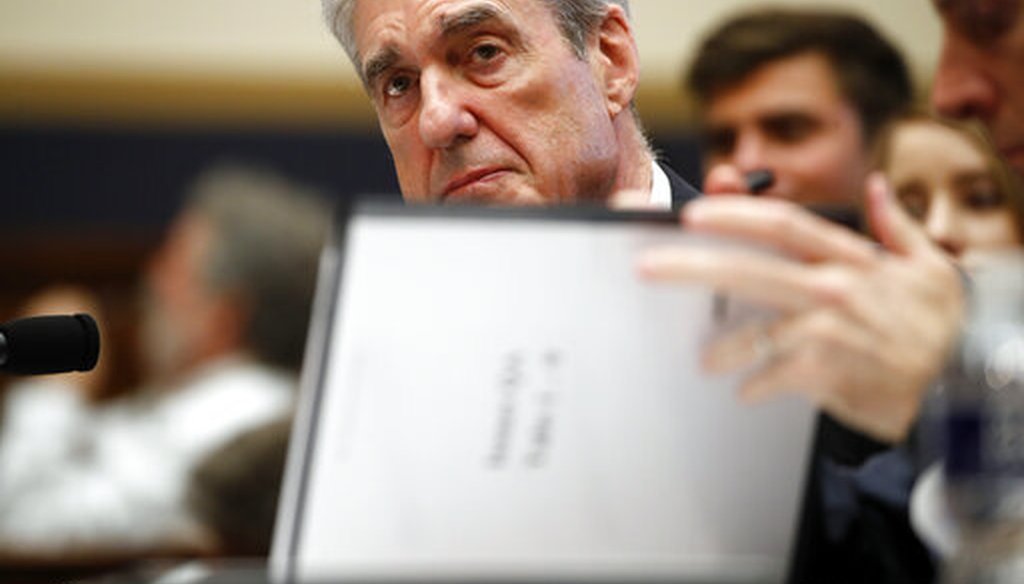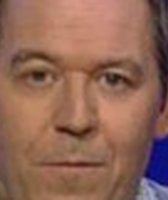Stand up for the facts!
Our only agenda is to publish the truth so you can be an informed participant in democracy.
We need your help.
I would like to contribute

Former special counsel Robert Mueller testifies before the House Judiciary Committee on July 24, 2019, in Washington. (AP/Brandon)
Could President Donald Trump face criminal charges after he leaves office? Former special counsel Robert Mueller’s testimony before Congress had pundits trying to answer that question.
On the July 25 episode of "Fox & Friends," host Ainsley Earhardt said news reports that said Trump could be indicted after leaving office were "not factually correct" because they didn’t take into account a correction Mueller made to his testimony.
"He corrected himself and he said something about, ‘we couldn’t come up with a determination,’ which means that they couldn’t find a crime," Earhardt said. "But if you watched ABC, if you watched CBS, if you watched NBC, ABC said that Trump could still face criminal charges after he leaves office. That’s not necessarily true."
However, "true" is the exact word Mueller used when asked if Trump could be charged after his presidency, and the former special counsel’s correction was about something totally different.
"A president can be indicted when he leaves office, I know that," Earhardt said on air the next day. "I was questioning whether this president will be indicted based on the Mueller report."
Since the topic involves speculation about future legal issues, we decided not to rate Earhardt’s claim on the Truth-O-Meter. But there’s clearly some confusion over whether Trump could be prosecuted once his time in the White House ends, so we wanted to step in with the facts.
The bottom line: Mueller testified twice that a president could be indicted after leaving office, and the four legal experts we spoke to all agreed.
Throughout his testimony, Mueller made it clear that Trump the president could not be indicted. But Trump the citizen, like all ex-presidents, is a different story.
Here’s Mueller’s first exchange on the matter, with Rep. Jerrold Nadler, D-N.Y.:
Nadler: "Under Department of Justice policy, the president could be prosecuted for obstruction of justice crimes after he leaves office, correct?"
Mueller: "True."
Here’s the second exchange, with Rep. Ken Buck, R-Co.:
Buck: "Okay, but could you charge the president with a crime after he left office?"
Mueller: "Yes."
Buck: "You believe that he committed — you could charge the president of the United States with obstruction of justice after he left office?"
Mueller: "Yes."
Buck: "Ethically, under the ethical standards?"
Mueller: "I'm not certain because I haven't looked at the ethical standards, but the OLC opinion says that the prosecutor, while he cannot bring a charge against a sitting president, nonetheless he can continue the investigation to see if there are any other persons who might be drawn into the conspiracy."
Notably, while Mueller said Trump could face charges after he leaves office, he did not say that the president should face charges.
Legal experts we spoke to agreed with Mueller.
"Once a president is out of office, the primary reasons to avoid prosecution — deference to impeachment and the need to avoid distraction of the chief executive from his or her important duties — both evaporate," said Mark Osler, professor of law at the University of St. Thomas.
Arguments based on the president’s "supposed position at the top of the prosecutorial hierarchy" also lose force for ex-presidents, said Cornell University law professor Josh Chafetz.
Diane Marie Amann, professor of law at the University of Georgia, pointed out that even the Justice Department ruling that says a sitting president cannot be indicted includes a line specifying that the prohibition fades when he or she leaves office.
"The constitutional structure permits a sitting president to be subject to criminal process only after he leaves office or is removed therefrom through the impeachment process," it says.
Earhardt and others — including Trump himself — confused Mueller’s remarks about Trump being charged after his presidency with other comments Mueller later corrected.
But Mueller made one correction to his testimony, and it had nothing to do with whether Trump could be charged once he’s out of the White House.
The correction addressed Mueller’s response to a question from Rep. Ted Lieu, D-Calif., when the former special counsel seemed to suggest Trump would have been indicted were it not for the Justice Department’s ruling that says a sitting president cannot be indicted.
Here’s the exchange between Lieu and Mueller:
Lieu: "The reason, again, that you did not indict Donald Trump is because of (Office of Legal Counsel) opinion stating that you cannot indict a sitting president, correct?"
Mueller: "That is correct."
On its face, Mueller’s answer implied that the OLC ruling was the only reason Trump was not indicted. But that’s not what his team has said in the report or in public statements.
Later, Mueller clarified his response. He said:
"I want to go back to one thing that was said this morning by Mr. Lieu, who said, and I quote, ‘You didn't charge the president because of the OLC opinion.’
That is not the correct way to say it. As we say in the report and as I said in the opening, we did not reach a determination as to whether the president committed a crime."
Our Sources
Fox News, "Fox & Friends," July 25, 2019
Fox News, "Fox & Friends," July 26, 2019
Mediaite, "Fox Host Ainsley Earhardt: ‘Not Factually Correct’ to Report Trump Could Faces Charges After Leaving Office," July 25, 2019
NBC News, "Full transcript: Mueller testimony before House Judiciary, Intelligence committees," July 25, 2019
C-Span, "Robert Mueller Testifies Before House Intelligence Committee," July 24, 2019
C-Span, "Robert Mueller Testifies Before House Judiciary Committee," July 24, 2019
U.S. Department of Justice, Special Counsel Robert Mueller’s Report, March 2019
U.S. Department of Justice, "A Sitting President’s Amenability to Indictment and Criminal Prosecution," Oct. 16, 2000
CBS News, "Did Mueller change his statement that Trump could be indicted after he leaves office?" July 25, 2019
The Washington Post, "Mueller muddies the water on why Trump didn’t face indictment," July 24, 2019
CNN, "Fact check: Trump falsely says Mueller corrected statement that he could be indicted once out of office," July 24, 2019
Politico, "How Trump Could Be Prosecuted After the White House," June 6, 2019
Eliana Johnson on Twitter, May 29, 2019
Email interview with Josh Chafetz, professor of law at Cornell University, July 25, 2019
Email interview with Mark Osler, professor of law at the University of St. Thomas, July 25, 2019
Email interview with Ciara Torres-Spelliscy, professor of law at Stetson University, July 25, 2019
Email interview with Diane Marie Amann, professor of law at the University of Georgia, July 26, 2019






























